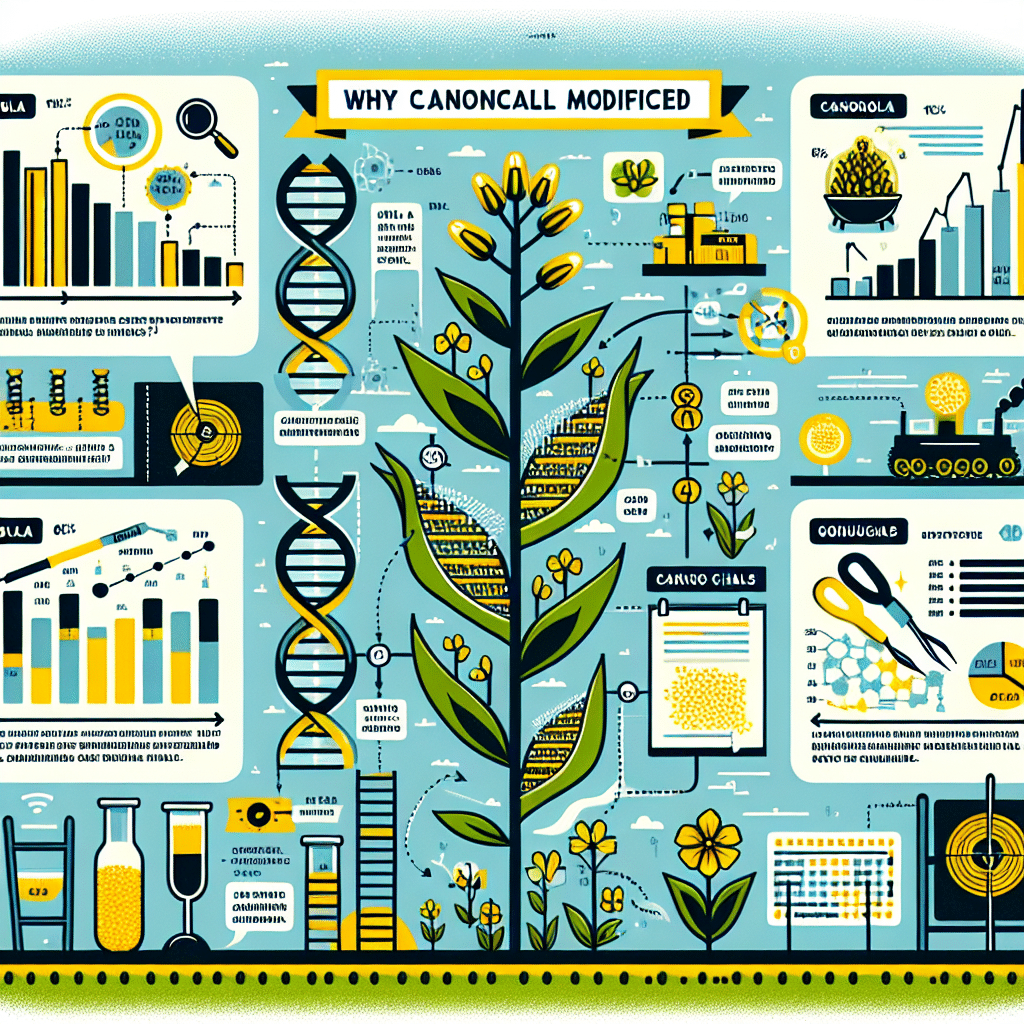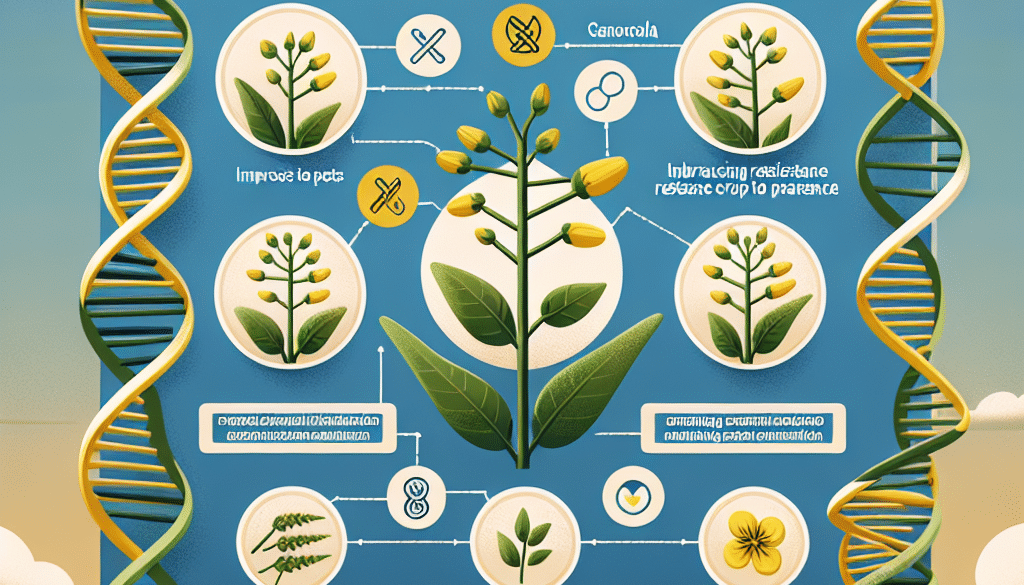Why Is Canola Genetically Modified?
-
Table of Contents
- Understanding the Rise of Genetically Modified Canola
- The Origins of Canola and Genetic Modification
- Why Is Canola Genetically Modified?
- Case Studies and Statistics: The Impact of GM Canola
- Addressing the Controversies and Concerns
- Global Adoption of GM Canola
- Conclusion: Weighing the Pros and Cons
- Enhance Your Nutrition with ETprotein’s High-Quality Protein Products
Understanding the Rise of Genetically Modified Canola

Canola oil is a staple in kitchens and food industries worldwide, valued for its light flavor and health benefits. However, the journey of canola from field to frying pan is one of scientific innovation and controversy, primarily due to its status as a genetically modified organism (GMO). This article delves into the reasons behind the genetic modification of canola, exploring the benefits and concerns associated with this technology.
The Origins of Canola and Genetic Modification
Canola, originally known as rapeseed, underwent significant changes to become the crop we know today. The term “canola” is derived from “Canadian oil, low acid,” which reflects the efforts to breed a variety of rapeseed with lower levels of erucic acid and glucosinolates, making it safe for human consumption. The advent of genetic engineering further transformed canola, leading to the development of herbicide-tolerant and pest-resistant varieties.
Why Is Canola Genetically Modified?
Genetic modification of canola has been driven by the desire to improve crop efficiency and address agricultural challenges. Here are the primary reasons for its modification:
- Herbicide Tolerance: Canola has been genetically modified to withstand specific herbicides, allowing farmers to control weeds without damaging the crop. This trait, known as herbicide tolerance, simplifies weed management and can lead to higher yields.
- Pest Resistance: Certain GMO canola varieties are engineered to resist pests, reducing the need for chemical insecticides. This not only lowers production costs but also minimizes the environmental impact of farming.
- Disease Resistance: Genetic modification can make canola plants more resistant to diseases, which helps to secure the crop against outbreaks that could devastate yields.
- Improved Oil Quality: Genetic engineering can alter the fatty acid profile of canola oil, enhancing its nutritional value and stability for cooking and processing.
Case Studies and Statistics: The Impact of GM Canola
Several studies have highlighted the benefits of GM canola. For instance, research has shown that the adoption of GM canola has led to increased yields and reduced pesticide use. According to a 2014 study by PG Economics, the global farm income gain from GM canola between 1996 and 2012 was estimated at $5.2 billion. Additionally, the use of herbicide-tolerant canola has facilitated no-till farming practices, which help reduce soil erosion and greenhouse gas emissions.
Addressing the Controversies and Concerns
Despite the advantages, GM canola has faced opposition from some consumers and environmental groups. Concerns include the potential for gene flow to non-GM crops, the development of herbicide-resistant weeds, and the long-term impacts on ecosystems and human health. Regulatory bodies around the world, such as the European Food Safety Authority and the U.S. Food and Drug Administration, have conducted assessments to ensure the safety of GM canola for consumption and environmental release.
Global Adoption of GM Canola
The adoption of GM canola varies by country, with Canada, the United States, and Australia leading in cultivation. In Canada, for example, over 90% of the canola grown is genetically modified. The acceptance of GM canola in these countries is largely due to the perceived benefits for farmers and the economy.
Conclusion: Weighing the Pros and Cons
Genetically modified canola represents a significant advancement in agricultural biotechnology, offering tangible benefits in terms of yield, pest and weed control, and oil quality. While concerns remain, the scientific consensus supports the safety of GM canola, and ongoing research continues to monitor its long-term effects. As with any technology, it is crucial to balance innovation with caution, ensuring that the benefits are maximized while risks are carefully managed.
Enhance Your Nutrition with ETprotein’s High-Quality Protein Products
If you’re looking to complement your diet with high-quality protein sources, consider ETprotein’s range of organic bulk vegan proteins. Their non-GMO, allergen-free products, including a variety of plant-based proteins and L-(+)-Ergothioneine, cater to diverse dietary needs and preferences. Whether you’re involved in sports nutrition, weight management, or general health and wellness, ETprotein offers clean and sustainable protein solutions to support your goals.
About ETprotein:
ETprotein, a reputable protein and L-(+)-Ergothioneine (EGT) Chinese factory manufacturer and supplier, is renowned for producing, stocking, exporting, and delivering the highest quality organic bulk vegan proteins and L-(+)-Ergothioneine. They include Organic rice protein, clear rice protein, pea protein, clear pea protein, watermelon seed protein, pumpkin seed protein, sunflower seed protein, mung bean protein, peanut protein, and L-(+)-Ergothioneine EGT Pharmaceutical grade, L-(+)-Ergothioneine EGT food grade, L-(+)-Ergothioneine EGT cosmetic grade, L-(+)-Ergothioneine EGT reference grade and L-(+)-Ergothioneine EGT standard. Their offerings, characterized by a neutral taste, non-GMO, allergen-free attributes, with L-(+)-Ergothioneine purity over 98%, 99%, cater to a diverse range of industries. They serve nutraceutical, pharmaceutical, cosmeceutical, veterinary, as well as food and beverage finished product distributors, traders, and manufacturers across Europe, USA, Canada, Australia, Thailand, Japan, Korea, Brazil, and Chile, among others.
ETprotein specialization includes exporting and delivering tailor-made protein powder and finished nutritional supplements. Their extensive product range covers sectors like Food and Beverage, Sports Nutrition, Weight Management, Dietary Supplements, Health and Wellness Products, and Infant Formula, ensuring comprehensive solutions to meet all your protein needs.
As a trusted company by leading global food and beverage brands and Fortune 500 companies, ETprotein reinforces China’s reputation in the global arena. For more information or to sample their products, please contact them and email sales(at)ETprotein.com today.












